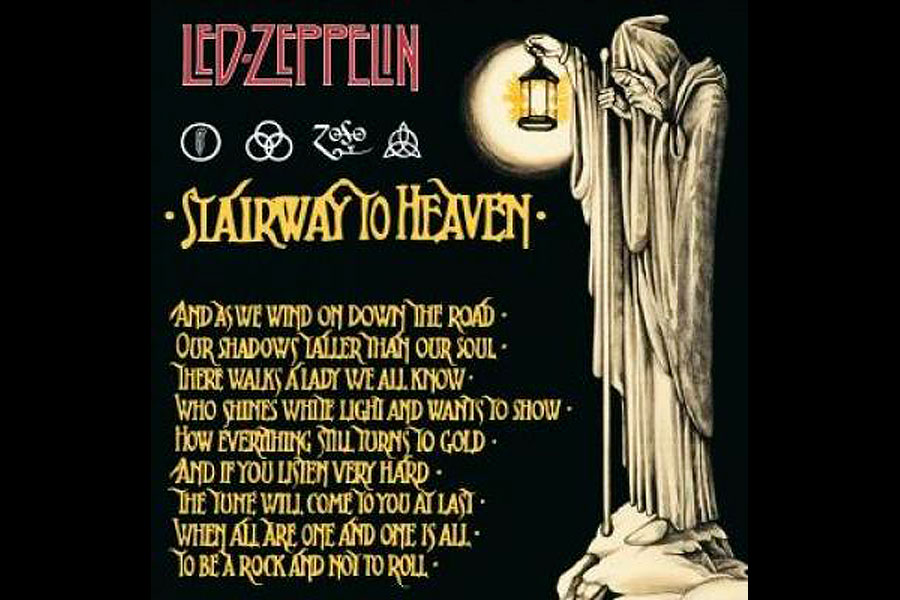“Stairway to Heaven” by Led Zeppelin is often regarded as one of the greatest rock songs of all time. Released in 1971 on their album Led Zeppelin IV, this enigmatic track has captured the imagination of listeners for decades. Its poetic lyrics, combined with an evolving musical structure, take the listener on a journey that is as mysterious as it is profound. But what does the song really mean?

Song Meaning Analysis
The song’s lyrics can be interpreted in various ways, with layers of spiritual, philosophical, and even existential themes. Each verse builds upon the last, creating a sense of progression—much like a journey up a stairway.
Verse 1: “There’s a lady who’s sure all that glitters is gold…”
The opening verse introduces a woman who believes that material wealth can buy her happiness or spiritual fulfillment. This line carries a clear warning: not everything that appears valuable will lead to enlightenment. The metaphor of “all that glitters is gold” emphasizes the theme of misguided pursuit. The gentle acoustic guitar sets a peaceful tone, drawing the listener into a reflective state.
Verse 2: “There’s a sign on the wall, but she wants to be sure…”
In the second verse, the woman begins to question her path. The “sign on the wall” represents guidance or a message, yet her uncertainty highlights the confusion often experienced in life’s spiritual journey. The tone of the music begins to shift, hinting at the progression from doubt to realization.
Verse 3: “In a tree by the brook, there’s a songbird who sings…”
This verse introduces a peaceful natural setting, symbolizing harmony with nature and inner peace. The “songbird” represents a higher truth or enlightenment, suggesting that answers to life’s big questions can often be found in simple, natural beauty. The music becomes more dynamic, with the addition of flute and layered vocals, creating a dreamlike atmosphere.
Verse 4: “If there’s a bustle in your hedgerow, don’t be alarmed now…”
This iconic line has sparked much debate. Many interpret it as a reminder not to be fearful of sudden or unexpected changes. The hedgerow may symbolize the boundary between the known and the unknown, life and death, or worldly concerns and spiritual awakening. The tempo and intensity of the song pick up here, reflecting a growing tension and movement towards a climax.
Verse 5: “And as we wind on down the road…”
The final verse shifts to a more universal tone, reflecting on the journey of life. The winding road suggests that life is a long and often unclear path. Yet, the refrain “to be a rock and not to roll” offers a message of strength and stability in the face of uncertainty. The electric guitar solo that follows this verse builds into an epic crescendo, symbolizing both the climax of the song and the culmination of the spiritual journey.
Key Themes and Symbolism
Led Zeppelin’s “Stairway to Heaven” is rich with spiritual metaphors and symbolism. The central metaphor of a stairway to heaven represents the journey toward spiritual enlightenment or self-discovery. The recurring theme of materialism versus true fulfillment plays a key role, with the song cautioning against seeking happiness through material means.
The use of nature, such as references to birds, trees, and brooks, serves to emphasize harmony and connection with the world as a source of truth. Meanwhile, the progression of the music—from soft acoustic to hard rock—mirrors the personal evolution depicted in the lyrics.
Historical Context
Released in 1971 during the height of Led Zeppelin’s career, “Stairway to Heaven” became an anthem of the 1970s. The song was written by guitarist Jimmy Page and vocalist Robert Plant. It reflected the growing interest in mysticism, spirituality, and alternative paths to enlightenment prevalent during that era. The decision to mix folk influences with hard rock helped create a timeless sound that was both innovative and accessible.
Critical Reception and Cultural Impact
“Stairway to Heaven” received widespread acclaim upon its release, even though it was never released as a single. It became one of the most requested songs on FM radio during the 1970s and continues to be a staple of classic rock stations. Rolling Stone ranked it among the “500 Greatest Songs of All Time.”
The song’s legendary status has made it the subject of numerous accolades and covers. However, it has also been the subject of legal disputes, most notably involving claims of copyright infringement regarding its intro. Despite this, the song’s impact remains undisputed, and it has become synonymous with Led Zeppelin’s legacy.
Conclusion
Led Zeppelin’s “Stairway to Heaven” is a song that transcends its era, offering listeners a deeply personal and spiritual journey. Through its poetic lyrics, powerful metaphors, and innovative musical composition, it remains one of the most revered tracks in rock history. Whether viewed as a cautionary tale or a path to enlightenment, “Stairway to Heaven” continues to inspire and captivate listeners worldwide.
Sources:



